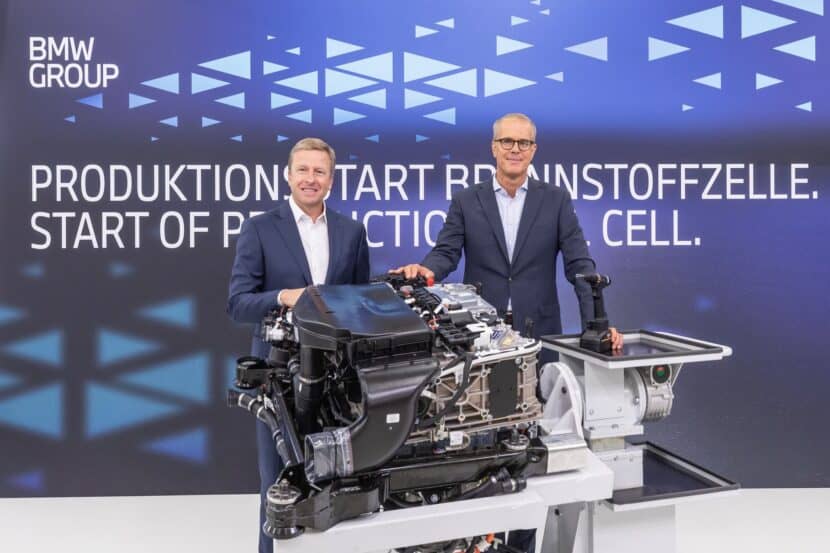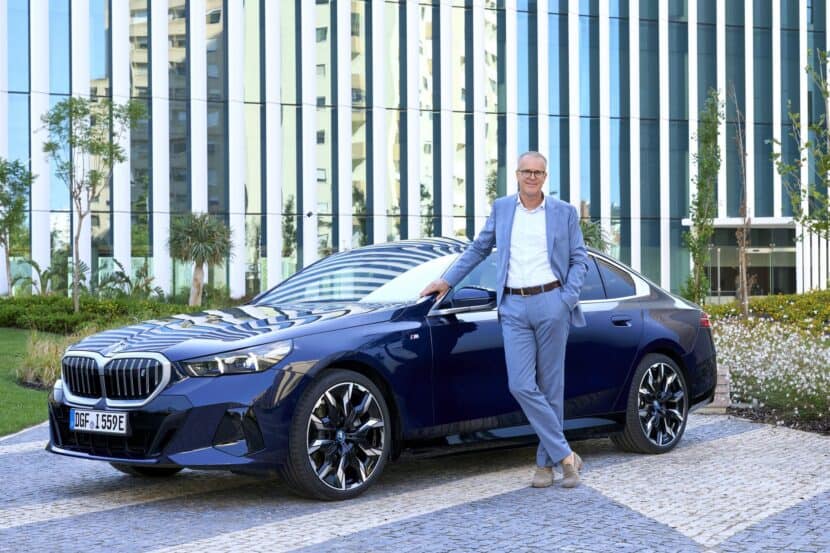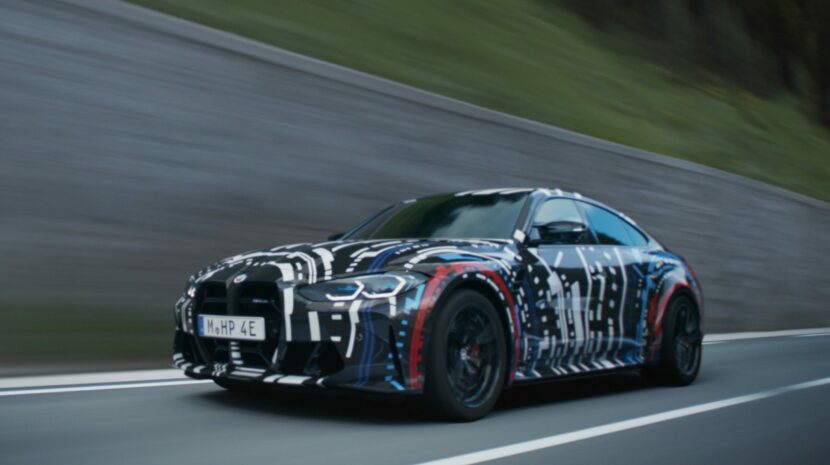Q&A with BMW R&D Boss:” We will build the best handling electric cars in the world”

[ad_1]
Frank Weber is the BMW board member in charge of overall vehicle development. As such, he is the father of the batch of electric models that will come to the market starting in 2025 and based on the same architecture. Probably the most important BMW project in the last 20 and in the next 20 years.
Joaquim Oliveira: After an early investment in electric propulsion with the i3 in 2013, BMW changed its strategy and eleven years later it is one of the brands that still does not have a modular platform for electric cars. It’s coming – the architecture of the Neue Klasse – but it’s not here yet. Why?
Frank Weber: When we look at the automotive industry we realize that we live in very special times to the point that not only we don’t know what will happen in the next three years, but in fact we are not even sure what it will be like at the end of the year. Almost all customers who enter our dealers are doubtful about which type of propulsion is best suited for them.
Even the so-called “early adopters” wonder whether they will have the right conditions to buy 100 percent electric cars and we also see some customers taking a step back, selling their electric cars and buying plug-in hybrids because they realized that the infrastructure is not ready and that the extended electric range of the latest PHEV opens new possibilities. And the uncertain nature of incentive programs only adds up to these dilemmas that plague product planning of every car manufacturer. That’s why investing in powertrain flexibility is vital for BMW.
Oliveira: Has BMW disappointed the market with this inversion of priorities?
Weber: Two years ago I heard and read comments that people were waiting for BMW to commit sooner to electric cars, with dedicated platforms. But that’s not the point. The point is that first you have to assess whether the prerequisites exist for this “all in” strategy in EVs. Is there enough green electricity? Are there sufficient sustainable raw materials? What about a charging infrastructure for everyone? And recycling systems in place for all materials?
The answer to all these questions is… “No!” Therefore, the strategy we defined proved to be the most correct and worked to our advantage. And that is why whenever I visit a dealer, they tell me that the choice given to consumers (to opt for different types of propulsion) is fundamental. The customer chooses the model and then he picks the powertrain.
Oliveira: Will this change with the arrival of the Neue Klasse?
Weber: Yes and no. Yes, because with the Neue Klasse architecture we will start to produce electric vehicles in large volumes. And no because we will continue to sell gasoline, diesel, plug-in hybrid cars. Our objective is to continue offering the best engines in each category and this will require continued investments, in addition to the fact that in many world regions combustion engines will continue to be on sale after 2035. We do not want our cars with electric motors to be those with modern propulsion technology and combustion engines to be the old engines with dated technology.
Oliveira: That means that BMW will keep on investing in combustion engines, unlike other rival manufacturers that already announced they will no longer invest in this area?
Weber: Absolutely. We will continue to invest and develop gasoline, diesel and plug-in hybrid engines, especially because it is not just about Europe having new, more demanding limits on polluting gas emissions. It’s a global process.
Oliveira: Why did you show the Neue Klasse concept sedan first and then the crossover considering the latter will be launched first?
Weber: We finished these two archetypes of almost all BMWs of the future at the same time and, in fact, they will hit the market practically simultaneously (we will start producing the pre-series units this year and in 2025 series production will kick-off, first in Hungary, then in Munich and then in the rest of the world). Therefore, the decision to start with the crossover is strategic because today half of BMW’s sales, globally, are of “X” vehicles. Which means that there are regions where they weigh up to two thirds and these models are leaders in their segment. But both concepts are inspired by our slogan “The Ultimate Driving Machine,” which means that our electric cars will also be the best handling cars on the road.
Oliveira: Does this have to do with the vehicles’ general control computing units?
Weber: The new driving dynamics controller is one of the main elements, probably the most important. It is difficult to make such a complex controller, which contains all the DNA of BMW car dynamics from the last three decades. Steering, 4×4, ABS, rear axle steering, brakes. Everything we developed “in house”, all the algorithms integrated into this control unit like no other brand could do.
Oliveira: Can you confirm that the M electric cars will have an electric motor on each wheel?
Weber: Yes, the future electric M3, for example. And with acceleration and recuperation functions on each wheel, for a total power of almost 1 megawatt (note: more than 1300 ps), you can imagine that it will be something very special to achieve but also to drive. Even I was surprised when I tested the prototypes. Our engineers at the M division were apprehensive about this transition to e-mobility because, for example, they feared losing very important elements that define the authenticity of BMW M: the combustion engine and the transmission. But in the meantime, they realized that with these very precise and powerful controllers it is possible to raise the dynamic competence of our cars to an even higher level than with combustion engines.
Oliveira: Are Tesla (which already produces two million electric cars a year) and the Chinese (who have gone from threat to reality) taking away your sleep?
Weber: At BMW, EV sales grew by 75 percent in 2023 and we are the market leader for premium electric cars. In the case of Tesla and the Chinese, we see the prices of the electric cars they are selling (which have dropped in the case of Tesla and were already artificially “low” in the Chinese brands) and we understand these are not sustainable practices (because electric cars are still more expensive to produce and are denying them the possibility of being profitable). We didn’t get into that price war, and we won’t. We look at the total German market (mainstream and premium) in January and we see that the i4 was the best-selling electric sedan, behind three SUVs, which shows that our strategy is correct. As for the brands that radically lowered prices, this will be reflected in their financial reports.
Oliveira: You mentioned EV profits. Will the Neue Klasse models allow the same profit margins as those with combustion engines?
Weber: We want to be at the same level. We achieved a 50 percent cost reduction in electric propulsion (motors, battery, power electronics) which will allow us to have more competitive prices, yes, but still more expensive than equivalent petrol/diesel derivatives. But then we have to take into account that the cost per kilometer of an electric car is much lower and this is what made diesel successful in Europe for decades (diesel cars were more expensive, but people preferred them because the fuel was cheaper and the engines used less fuel).
Oliveira: Does this mean that the main purchasing motivation for Europeans is the price of the energy that makes the vehicle move?
Weber: Without a doubt. The single individual factor that most influences the increase or decrease in the market share of electric vehicles is the price of gasoline/diesel, not environmental concerns, not the cost of raw materials and not any other factor.
Oliveira: With the current change in customer values and offer in the automobile market, who are your main competitors at the moment?
Weber: The customer does not compare companies; he compares products directly. Which means the i4 will have to compete with a Tesla Model 3 and a petrol 3 Series will have to be better than a Toyota hybrid and superior enough to justify the price increase for a premium product. This means that everything becomes more complex for us in these new times.
Oliveira: Up until recently, “traditional” automotive brands were seen as such, but in the meantime you and your peers also started producing software. Tesla was a kind of a software company that also builds cars. Do you feel that, after the launch of the Neue Klasse models, the two areas will be at the same level in your company?
Weber: I do. And I can tell you that, along with Tesla, we are the only car manufacturer in the world that has a fleet of six million vehicles that can be updated over-the-air. I’m not talking about updates to superficial infotainment layers, which we also update, but about updates to the car’s driver assistance systems. And at BMW we have never postponed the scheduled start of production of a new model for reasons related to software or battery, but there are several of our competitors who cannot say the same.
Oliveira: BMW is very keen on emphasizing how relevant circular economy is and how it will be the future. What is the determining aspect that will make the difference in this challenge?
Weber: The battery issue is fundamental. If we think about the 600 kilograms of a large battery, 80 to 90 percent are valuable materials and of that amount, 95 percent can be recycled. If this issue is not technically solved, everything else (seats, dashboards, tires…) is residual and has a much smaller impact in the whole vehicle production cycle, value chain and environment.
[ad_2]




